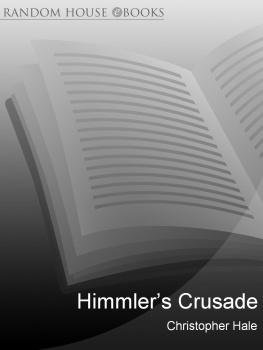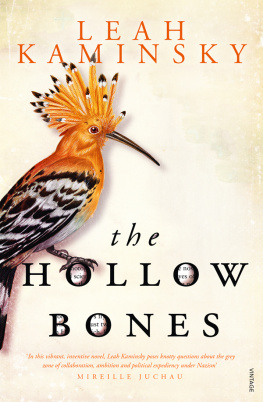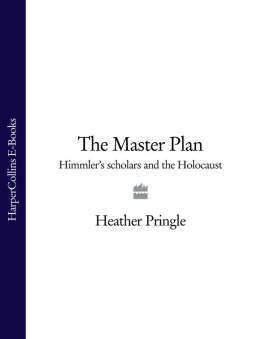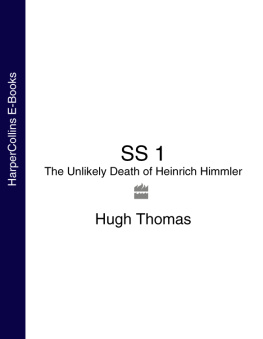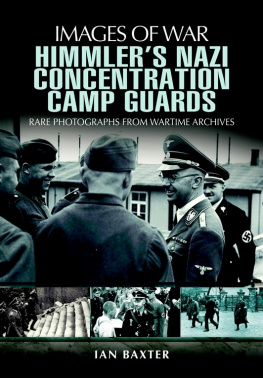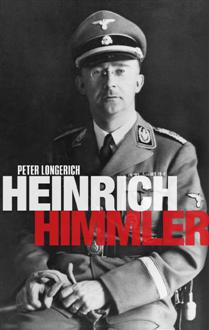Chris Hale - Himmlers Crusade
Here you can read online Chris Hale - Himmlers Crusade full text of the book (entire story) in english for free. Download pdf and epub, get meaning, cover and reviews about this ebook. year: 2004, publisher: Bantam Books (Transworld Publishers a division of the Random House Group), genre: Religion. Description of the work, (preface) as well as reviews are available. Best literature library LitArk.com created for fans of good reading and offers a wide selection of genres:
Romance novel
Science fiction
Adventure
Detective
Science
History
Home and family
Prose
Art
Politics
Computer
Non-fiction
Religion
Business
Children
Humor
Choose a favorite category and find really read worthwhile books. Enjoy immersion in the world of imagination, feel the emotions of the characters or learn something new for yourself, make an fascinating discovery.
- Book:Himmlers Crusade
- Author:
- Publisher:Bantam Books (Transworld Publishers a division of the Random House Group)
- Genre:
- Year:2004
- Rating:5 / 5
- Favourites:Add to favourites
- Your mark:
- 100
- 1
- 2
- 3
- 4
- 5
Himmlers Crusade: summary, description and annotation
We offer to read an annotation, description, summary or preface (depends on what the author of the book "Himmlers Crusade" wrote himself). If you haven't found the necessary information about the book — write in the comments, we will try to find it.
Himmlers Crusade — read online for free the complete book (whole text) full work
Below is the text of the book, divided by pages. System saving the place of the last page read, allows you to conveniently read the book "Himmlers Crusade" online for free, without having to search again every time where you left off. Put a bookmark, and you can go to the page where you finished reading at any time.
Font size:
Interval:
Bookmark:

CONTENTS
In 1938, on the eve of war, a Nazi expedition set out through British India on a mission sponsored by SS Reichsfhrer Heinrich Himmler himself. Led by two complex individuals Ernst Schfer, a swashbuckling naturalist for whom Nazism promised a short-cut to personal glory, and Bruno Beger, an anthropologist who would take his racial theories to their logical conclusion at Auschwitz its aim was to establish the origins of the Aryan race, high in the sacred mountains of Tibet.
Despite abundant documentation diaries, letters, secret reports, photographs and a remarkable film the full story of Schfers ill-fated expedition has, until now, never been told. In a true adventure reminiscent at times of Indiana Jones, Himmlers Crusade is an enthralling account of this extraordinary quest and explores the ideological roots of the Nazis obsession with racial theory and the occult. Drawing on this wealth of primary material as well as his own interviews with Bruno Beger, Christopher Hale has written a fascinating, thought-provoking book that brilliantly evokes this little-known prelude to the unimaginable horror that came out of the Second World War.

To Alice and Felix
Deeds white and black, for minds are clean and foul.
Is the mind clean? Then earth and sky are clean.
Is the mind foul? Then earth and sky are foul.
For it is upon the mind that all depends.
Tibetan proverb, quoted by Charles Bell
German science must become fighting science.
Gerd Tellenbach in Der Fhrer, 1936


Any book, and especially a first one, arrives loaded with a tremendous cargo of debt. Here is a brief summary of the main ones. I must begin by thanking Deborah West Denno who convinced me that I could write the book you hold in your hands and provided consistent and stimulating encouragement throughout its gestation. Professor Steve Jones generously introduced me to his and now my literary agent Peter Robinson who provided expert guidance and support. Adam Sisman was also a font of writing wisdom. Doug Young in London and Hana Lane in New York were attentive editors and enthusiastic publishers.
I also owe much to my former colleagues at the BBC, John Lynch and Bettina Lerner, despite some differences over the years. They commissioned a film about the myth of Atlantis for the BBCs flagship Horizon programme and, in the course of researching this now notorious film with terrific colleagues Jacquelines Smith and Laughton and Julian Hudson, I first learnt about the SS Expedition to Tibet. At SOAS in London, Alex McKay was consistently generous with ideas and leads and set me right on many points. Roger Croston, an exceptionally erudite enthusiast about all things Tibetan, had been corresponding with Bruno Beger, the last surviving European member of the Schfer Expedition. Beger had been convicted by a Frankfurt court as an accomplice to murder in 1971 for reasons that are explained in detail in the last part of this book. While I was researching the films for Horizon, I was unable to obtain an interview with Beger but Mr Croston was able to secure a number of meetings on my behalf in the autumn of 2001. Dr Isrun Engelhardt, the foremost authority on Ernst Schfer, the zoologist who led the expedition, provided me with extracts from her heroic decipherment of Schfers barely readable expedition Diaries. Peter Longerich discussed his current work on Heinrich Himmler. In Germany, Dr Helmut Starrach and Dr Heinz-Georg Kls talked to me about Ernst Schfer as a friend and colleague but chose not to discuss his experiences during the war.
In the United States, Andrew Zimmerman provided authoritative guidance on the history of German anthropology and answered my very frequent queries. In Philadelphia the staff in the library of the Academy of Natural Sciences was consistently supportive. In New York, Hope Cook, the former wife of the late Chogyal of Sikkim, provided wisdom and all kinds of contacts. Jacqueline Hiltz shared her knowledge of Sikkim and its history, pointed me towards the Sikkim National Archives in Gangtok and sent me her notes on the material held in the Archives concerning Schfers friend Kaiser Thapa. In Sikkim itself, I have to thank Anna Balikci, German Akeh Bhutia, Taj Thapa, T. W. Barphungpa, Jigme Dorje Denjongpa, Keshab and Sailesh Pradhan, Kelsang Gyatso and the many others who guided me as I tried to follow Schfers route beyond Gangtok. Jai Shree Pradham assisted me in the Archives in Gangtok. In Tibet I am indebted above all to Gyurme Dorje while in London a number of people assisted me with different puzzles and conundrums including Thierry Dodin at the Tibet Information Network.
Anyone researching in this field will inevitably come to rely on the following authors: Karl Meyer and Shareen Brysac who provided advice and assistance, and whose book Tournament of Shadows is an enthralling account of the Great Game and has a chapter on Schfer. Peter Hopkirks several books on the same subject were essential reading as were Nicholas Goodrick-Clarks The Occult Roots of Nazism and Black Sun. Melvyn Goldstein answered some of my most obscure questions and no account of Tibet in the twentieth century can afford to ignore his A History of Modern Tibet. Alex McKays Tibet and the British Raj and Patrick Frenchs book about Sir Francis Younghusband were both equally important as reservoirs of ideas and information. Simon Winchesters book about the Yangtze The River at the End of the World allowed me to see and better understand a part of the world I could not visit. Other important sources were Ian Kershaws two-volume biography of Hitler and the magisterial books by Deborah Dwork and Robert Jan Van Pelt on the Holocaust. My debt to all these authors is considerable and I hope they will forgive me for not footnoting every reference.
The bibliography on Nazism, the Second World War and the Holocaust is, of course, vast in English and German. The Schfer Expedition itself left behind a tremendous quantity of documentation which few had examined let alone translated. To tell the story that follows, I needed to work across a Himalaya of German documents and I would like to thank, especially, Diana Jasmin Bhmer, who waded through Ernst Schfers rather turgid narratives and answered endless questions about the precise interpretation of numerous other documents with an unquenchable supply of good humour, intelligence and commitment. Sabine Pusch, Ingrid Bchner, Michael Kolodziej and, in particular, Ruth Mulandi provided invaluable help and advice with other materials.
In Germany, Wolf Gebhardt guided me through the labyrinth of the Bundesarchiv in Berlin and the dedicated and courteous staff of the extraordinary Instit fr Zeitgesichte in Munich gave me access to parts of Bruno Begers trial record. In Koblenz, Berit Pistora made the task of examining the many thousands of prints and negatives taken by expedition members a pleasure. The staff of the National Archives in Washington, DC introduced me to their remarkable collections of captured German documents. In the same city, academic staff at the Holocaust Museum provided me with important and disturbing information about the transports from Berlin to Auschwitz in the spring of 1943 and Madelaine Matz in the Library of Congress showed me the rushes of Schfers film
Font size:
Interval:
Bookmark:
Similar books «Himmlers Crusade»
Look at similar books to Himmlers Crusade. We have selected literature similar in name and meaning in the hope of providing readers with more options to find new, interesting, not yet read works.
Discussion, reviews of the book Himmlers Crusade and just readers' own opinions. Leave your comments, write what you think about the work, its meaning or the main characters. Specify what exactly you liked and what you didn't like, and why you think so.

